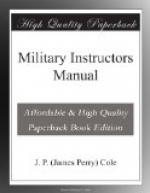Wherever possible, particularly where there is likely to be movement in and out of the shelter, two blankets fitted in this way but sloping in opposite directions should be provided. There should be an interval of at least three feet between the two frames, and the larger this vestibule is made the more efficient is the dugout.
When not in use, the blankets should be rolled up and held so that they can be readily released, and should be sprayed occasionally with water or a little Vermorel sprayer solution.
If the blankets became stiff from a deposit of chemicals, they should be sprayed with water.
All ranks must be taught how to use gas-proof dugouts, e.g., how to enter a protected doorway quickly, replacing the blanket immediately, and carrying in as little outside air as possible.
The protection afforded by these means is just as complete against lachrymatory gases as it is against cloud gas and poisonous shell gases.
(2) SHELTERS WHICH SHOULD BE PROTECTED:
The following should always be protected:
Medical aid posts and advanced dressing stations; Company, Battalion and Brigade Headquarters; signal shelters and any other place where work has to be carried out during a gas attack.
In addition to the above, it is desirable to protect all dugouts, cellars and buildings within the shell area, particularly those of artillery personnel. It should be noted, however, that the protection of dugouts for troops in the front line of trenches is usually inadvisable on account of the delay involved in getting men out in time of attack. It is desirable to protect stretcher bearers’ dugouts with a view to putting casualties in them.
D. Protection of Weapons and Equipment:
Arms and ammunition and the metal parts of special equipment (e.g., telephone instruments) must be carefully protected against gas by greasing them or keeping them completely covered. Otherwise, particularly in damp weather, they may rust or corrode so badly as to refuse to act. A mineral oil must be used for this purpose. The following in particular should be protected:
(1) SMALL ARMS AND S.A.A.
Machine guns and rifles must be kept carefully cleaned and well oiled. The effects of corrosion of ammunition are of even more importance than the direct effects of gas upon machine guns and rifles.
Ammunition boxes must be kept closed. Vickers belts should be kept in their boxes until actually required for use. The wooden belt boxes are fairly gas-tight, but the metal belt boxes should be made gas-tight by inserting strips of flannelette in the joint between the lid and the box.
Lewis magazines should be kept in some form of box, the joints of which are made as gas-tight as possible with flannelette.
A recess should be made, high up in the parapet if possible, for storing ammunition and guns. A blanket curtain, moistened with water or sprayer solution, will greatly assist in keeping the gas out.




